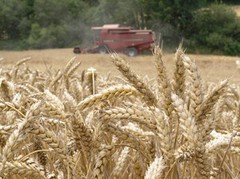Ukraine expects a smaller grain harvest this year, which will have a global impact

Ukraine's grain harvest this year will fall by 10% this year, the government estimates, which will be felt around the world, although the restoration of export capacity from Russia-threatened Black Sea ports allows the country to remain a major global supplier.
According to the estimates of the Ministry of Agriculture, in 2024 Ukrainian farmers will harvest a total of 74 million tons of grain and oil crops compared to 82 million tons last year. "The forecast is preliminary and will be adjusted during the year depending on circumstances," the ministry warned on Wednesday.
The invasion continues, the consequences are growing
The negative trend is a direct consequence of the challenges brought about by the Russian invasion, Pavlo Koval, Director General of the Ukrainian Agrarian Confederation, told Efeagro.
"Although the front remains relatively stable, in some areas the increase in shelling means that there is less arable land," he explained.
During the third spring sowing in the conditions of war, Ukrainian farmers also face internal and external logistical complications and low prices for their products, as well as reduced financing opportunities, contamination of large areas with explosive objects and mobilization of their workers.
Currently, according to Koval, wheat cultivation is not paying off, the harvest is expected to decrease by 13.5% to 19.2 million tons. Instead, according to analysts, Ukrainian farmers plan to harvest 5.2 million tons of soybeans this year, which is 10% more than in the previous season.
The financial consequences of the invasion are illustrated, for example, by the estimated cost of demining all agricultural lands, which is from 12 to 25 billion euros, according to the calculations of Oleg Nivyevskyi and Roman Neyter from the Kyiv School of Economics.
Only in the Kharkiv region (north-eastern Ukraine), half of the agricultural land, amounting to 570,000 hectares, is contaminated, the deputy head of the local administration Yevhen Ivanov said on Wednesday. According to Koval, 5 to 8 million hectares should be checked for explosives throughout the country.
With most demining operations taking more than 10 years to complete, farmers often risk their lives and machinery to plant crops as explosions occur regularly in frontline and temporarily occupied regions. With so many financial, operational and security challenges, it is becoming increasingly difficult for many to stay in the industry, Koval emphasizes.
Global consequences
According to the Ukrainian Grain Association, exports of grain and oilseeds may fall to 43.7 million tons in 2024/25 compared to 53.1 million tons in the previous marketing season.
According to Pavlo Koval, Ukraine is losing part of its foreign markets due to logistical and export problems, and in some cases it is being replaced by Russia, as it also sells "stolen" grain from Ukraine. However, he said, the invaded country remains a major player on a global scale. "Structural changes in Ukraine are measured in millions of tons, which will affect global price trends," he told Efeagro.
According to the Director General of the UAC, some Southern European countries, such as Spain, Portugal and Greece with grain shortages, as well as North African countries, the Persian Gulf and some Asian countries, will feel the impact of a reduction in wheat exports from Ukraine. According to him, even if Ukraine is replaced by other suppliers, prices will rise.
Much also depends on the further functioning of the export routes through the Black Sea and the Danube, which are still threatened by Russia, analysts warn.
Ukraine was able to export up to 5.8 million tons of agricultural products a month after its drones and missiles knocked out the Russian fleet from the northwestern Black Sea.
The recovery of exports from the large port of Mykolaiv could also help producers in Ukraine and consumers abroad, but any forecast is only preliminary, Koval believes. "The situation may change due to a number of factors, including the military situation," he warned.
IC UAC according to Efeagro
- 4556 reads





